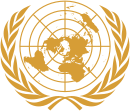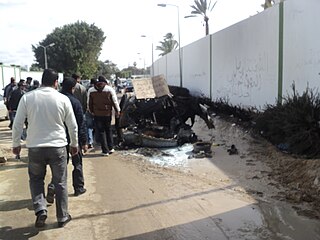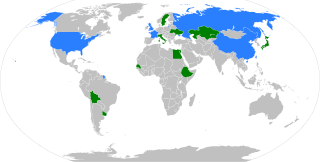| Part of a series on the |
| UN Security Council resolutions |
|---|
 |
| Permanent members |
| Resolutions 1 to 1000 |
| Resolutions 1001 to 2000 |
| Resolutions 2001 to 3000 |
| Resolutions by topic |
| Vetoed resolutions |
| List of vetoes · Power of veto |
| UN Security Council UNBISnet · Wikisource |
This is a list of United Nations Security Council Resolutions 2201 to 2300 adopted between 15 February 2015 and 26 July 2016.
| Resolution | Date | Vote | Concerns |
|---|---|---|---|
| 2201 | 15 February 2015 | 15–0–0 | Situation in Yemen |
| 2202 | 17 February 2015 | 15–0–0 | A letter from the permanent representative of the Russian Federation on the situation in Ukraine |
| 2203 | 18 February 2015 | 15–0–0 | Situation in Guinea-Bissau |
| 2204 | 24 February 2015 | 15–0–0 | Situation in Yemen |
| 2205 | 26 February 2015 | 15–0–0 | Reports of the Secretary-General on the Sudan |
| 2206 | 3 March 2015 | 15–0–0 | Situation in South Sudan |
| 2207 | 4 March 2015 | 15–0–0 | Extends mandate of expert panel monitoring Sanctions against North Korea |
| 2208 | 5 March 2015 | 15–0–0 | Situation in Libya |
| 2209 | 6 March 2015 | 14–0–1 (Abstention: Venezuela) | Chemical weapons in Syria |
| 2210 | 16 March 2015 | 15–0–0 | Situation in Afghanistan |
| 2211 | 26 March 2015 | 15–0–0 | Situation in the Democratic Republic of the Congo |
| 2212 | 26 March 2015 | 15–0–0 | Situation in the Central African Republic |
| 2213 | 27 March 2015 | 15–0–0 | Situation in Libya |
| 2214 | 27 March 2015 | 15–0–0 | Situation in Libya |
| 2215 | 2 April 2015 | 15–0–0 | Situation in Liberia |
| 2216 | 14 April 2015 | 14–0–1 (Abstention: Russia) | Situation in Yemen |
| 2217 | 28 April 2015 | 15–0–0 | Situation in the Central African Republic |
| 2218 | 28 April 2015 | 15–0–0 | Situation in Western Sahara |
| 2219 | 28 April 2015 | 15–0–0 | Situation in Côte d'Ivoire |
| 2220 | 22 May 2015 | 9–0–6 (Abstentions: Angola, Chad, China, Nigeria, Russia, Venezuela) | Small arms |
| 2221 | 26 May 2015 | 15–0–0 | Situation in Somalia |
| 2222 | 27 May 2015 | 15–0–0 | Protection of Journalists |
| 2223 | 28 May 2015 | 15–0–0 | Situation in South Sudan |
| 2224 | 9 June 2015 | 15–0–0 | Non proliferation |
| 2225 | 18 June 2015 | 15–0–0 | Children and armed conflict |
| 2226 | 25 June 2015 | 15–0–0 | Situation in Ivory Coast |
| 2227 | 29 June 2015 | 15–0–0 | Situation in Mali |
| 2228 | 29 June 2015 | 15–0–0 | Reports of the Secretary-General on the Sudan and South Sudan |
| 2229 | 29 June 2015 | 15–0–0 | Situation in Middle East |
| 2230 | 14 July 2015 | 15–0–0 | Reports of the Secretary-General on the Sudan and South Sudan |
| 2231 | 20 July 2015 | 15–0–0 | Iran nuclear terrorism |
| 2232 | 28 July 2015 | 15–0–0 | Situation in Somalia |
| 2233 | 29 July 2015 | 15–0–0 | Situation in Iraq |
| 2234 | 29 July 2015 | 15–0–0 | Situation in Cyprus |
| 2235 | 7 August 2015 | 15–0–0 | Situation in Syria |
| 2236 | 21 August 2015 | 15–0–0 | Situation in Lebanon |
| 2237 | 2 September 2015 | 15–0–0 | Situation in Liberia |
| 2238 | 10 September 2015 | 15–0–0 | Situation in Libya |
| 2239 | 17 September 2015 | 15–0–0 | Situation in Liberia |
| 2240 | 9 October 2015 | 14–0–1 (Abstention: Venezuela) | Maintenance of international peace and security |
| 2241 | 9 October 2015 | 13–0–2 (Abstentions: Russia, Venezuela) | Reports of the Secretary-General on the Sudan and South Sudan |
| 2242 | 13 October 2015 | 15–0–0 | Women and peace and security |
| 2243 | 14 October 2015 | 15–0–0 | Situation in Haiti |
| 2244 | 23 October 2015 | 14–0–1 (Abstention: Venezuela) | Situation in Somalia |
| 2245 | 9 November 2015 | 15–0–0 | Situation in Somalia |
| 2246 | 10 November 2015 | 15–0–0 | Situation in Somalia |
| 2247 | 10 November 2015 | 15–0–0 | Situation in Bosnia and Herzegovina |
| 2248 | 12 November 2015 | 15–0–0 | Situation in Burundi |
| 2249 | 20 November 2015 | 15–0–0 | Threats to international peace and security caused by terrorist acts |
| 2250 | 9 December 2015 | 15–0–0 | Maintenance of international peace and security |
| 2251 | 15 December 2015 | 15–0–0 | Reports of the Secretary-General on the Sudan and South Sudan |
| 2252 | 15 December 2015 | 13–0–2 (Abstentions: Russia, Venezuela) | Reports of the Secretary-General on the Sudan and South Sudan |
| 2253 | 17 December 2015 | 15–0–0 | Threats to international peace and security caused by terrorist acts |
| 2254 | 18 December 2015 | 15–0–0 | Situation in Syria |
| 2255 | 21 December 2015 | 15–0–0 | Threats to international peace and security caused by terrorist acts |
| 2256 | 22 December 2015 | 14–0–1 (Abstention: Russia) | International Criminal Tribunal for the former Yugoslavia (ICTY) and Rwanda (ICTR) |
| 2257 | 22 December 2015 | 15–0–0 | Middle East (UNDOF) |
| 2258 | 22 December 2015 | 15–0–0 | Situation in Syria |
| 2259 | 23 December 2015 | 15–0–0 | Situation in Libya |
| 2260 | 20 January 2016 | 15–0–0 | Situation in Côte d'Ivoire |
| 2261 | 25 January 2016 | 15–0–0 | Identical letters dated 19 January 2016 from the Permanent Representative of Colombia to the United Nations addressed to the Secretary-General and the President of the Security Council |
| 2262 | 27 January 2016 | 15–0–0 | Situation in the Central African Republic |
| 2263 | 28 January 2016 | 15–0–0 | Situation in Cyprus |
| 2264 | 9 February 2016 | 15–0–0 | Situation in the Central African Republic |
| 2265 | 10 February 2016 | 15–0–0 | Reports of the Secretary-General on the Sudan and South Sudan |
| 2266 | 24 February 2016 | 15–0–0 | Situation in Yemen |
| 2267 | 26 February 2016 | 15–0–0 | Situation in Guinea-Bissau |
| 2268 | 26 February 2016 | 15–0–0 | Situation in Syria |
| 2269 | 29 February 2016 | 11–0–4 (Abstentions: Angola, Egypt, Russia, Senegal) | International Criminal Tribunal for the former Yugoslavia (ICTY) International Criminal Tribunal for Rwanda (ICTR) |
| 2270 | 2 March 2016 | 15–0–0 | Non-proliferation and sanctions on North Korea |
| 2271 | 2 March 2016 | 15–0–0 | Reports of the Secretary-General on the Sudan and South Sudan |
| 2272 | 11 March 2016 | 14–0–1 (Abstention: Egypt) | United Nations peacekeeping operations |
| 2273 | 15 March 2016 | 15–0–0 | Situation in Libya |
| 2274 | 15 March 2016 | 15–0–0 | Situation in Afghanistan |
| 2275 | 24 March 2016 | 15–0–0 | Situation in Somalia |
| 2276 | 24 March 2016 | 15–0–0 | Non-proliferation and North Korea |
| 2277 | 30 March 2016 | 15–0–0 | Situation in the DR of the Congo |
| 2278 | 31 March 2016 | 15–0–0 | Situation in Libya |
| 2279 | 1 April 2016 | 15–0–0 | Situation in Burundi |
| 2280 | 7 April 2016 | 15–0–0 | Reports of the Secretary-General on the Sudan and South Sudan |
| 2281 | 26 April 2016 | 15–0–0 | Situation in the Central African Republic |
| 2282 | 27 April 2016 | 15–0–0 | Post-conflict peacebuilding |
| 2283 | 28 April 2016 | 15–0–0 | Situation in Côte d’Ivoire |
| 2284 | 28 April 2016 | 15–0–0 | Situation in Côte d’Ivoire |
| 2285 | 29 April 2016 | 10–2–3 (Against: Uruguay, Venezuela; Abstentions: Angola, New Zealand, Russia) | Situation in Western Sahara |
| 2286 | 3 May 2016 | 15–0–0 | Protection of civilians in armed conflict |
| 2287 | 12 May 2016 | 15–0–0 | Reports of the Secretary-General on the Sudan and South Sudan |
| 2288 | 25 May 2016 | 15–0–0 | Situation in Liberia |
| 2289 | 27 May 2016 | 15–0–0 | Situation in Somalia |
| 2290 | 31 May 2016 | 15–0–0 | Reports of the Secretary-General on the Sudan and South Sudan |
| 2291 | 13 June 2016 | 15–0–0 | The situation in Libya |
| 2292 | 14 June 2016 | 15–0–0 | The situation in Libya |
| 2293 | 23 June 2016 | 15–0–0 | The situation concerning the Democratic Republic of the Congo |
| 2294 | 29 June 2016 | 15–0–0 | The situation in the Middle East (UNDOF) |
| 2295 | 29 June 2016 | 15–0–0 | The situation in Mali |
| 2296 | 29 June 2016 | 15–0–0 | Reports of the Secretary-General on the Sudan and South Sudan |
| 2297 | 7 July 2016 | 15–0–0 | The situation in the Somalia |
| 2298 | 22 July 2016 | 15–0–0 | The situation in Libya |
| 2299 | 25 July 2016 | 15–0–0 | The situation concerning Iraq |
| 2300 | 26 July 2016 | 15–0–0 | The situation in Cyprus |











